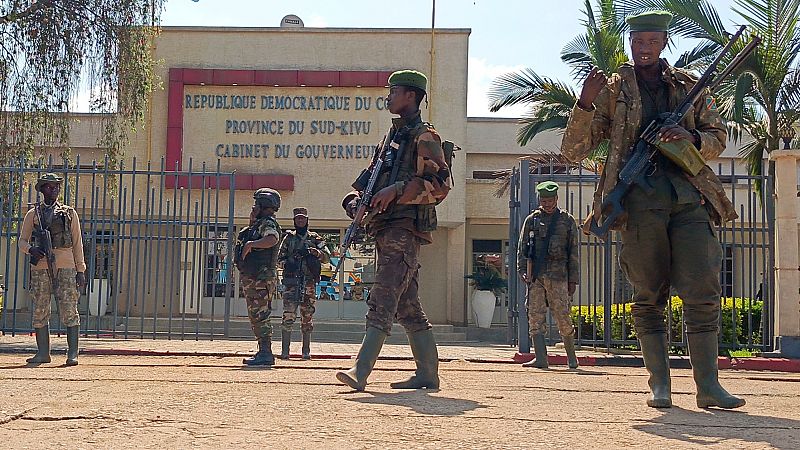DRC: Rebel-held territory expands with capture of Bukavu

Bernard Maheshe Byamungu, one of the M23 leaders who has been sanctioned by the U.N. Security Council for rights abuses, stood in front of the South Kivu governor’s office in Bukavu and told residents they have been living in a “jungle."
“We are going to clean up the disorder left over from the old regime,” Byamungu said, as some in the small crowd of young men cheered the rebels on to “go all the way to Kinshasa," Congo's capital, nearly 1,000 miles away.
Congo's communications ministry in a statement on social media acknowledged for the first time that Bukavu had been “occupied” and said the national government was “doing everything possible to restore order and territorial integrity” in the region.
One Bukavu resident, Blaise Byamungu, said the rebels marched into the city that had been “abandoned by all the authorities and without any loyalist force."
“Is the government waiting for them to take over other towns to take action? It’s cowardice,” Byamungu added.
Fears of regional escalation
Unlike in 2012, when the M23 briefly seized Goma and withdrew after international pressure, analysts have said the rebels this time are eyeing political power.
The fighting in Congo has connections with a decades-long ethnic conflict. The M23 says it is defending ethnic Tutsis in Congo. Rwanda has claimed the Tutsis are being persecuted by Hutus and former militias responsible for the 1994 genocide of 800,000 Tutsis and others in Rwanda. Many Hutus fled to Congo after the genocide and founded the Democratic Forces for the Liberation of Rwanda militia group.
Rwanda says the militia group is “fully integrated” into the Congolese military, which denies it.
But the new face of the M23 in the region — Corneille Nangaa — is not Tutsi, giving the group “a new, more diverse, Congolese face, as M23 has always been seen as a Rwanda-backed armed group defending Tutsi minorities,” according to Christian Moleka, a political scientist at the Congolese think tank Dypol.
Congo’s President Felix Tshisekedi, whose government on Saturday asserted that Bukavu remained under its control, has warned of the risk of a regional expansion of the conflict.
Congo's forces were being supported in Goma by troops from South Africa and in Bukavu by troops from Burundi. But Burundi's president, Evariste Ndayishimiye, appeared to suggest on social media his country would not retaliate in the fighting.
The conflict was high on the African Union summit's agenda in Ethiopia over the weekend, with U.N. Secretary-General António Guterres warning it risked spiraling into a regional conflagration.
Still, African leaders and the international community have been reluctant to take decisive action against M23 or Rwanda, which has one of Africa's most powerful militaries. Most continue to call for a ceasefire and a dialogue between Congo and the rebels.
Today

